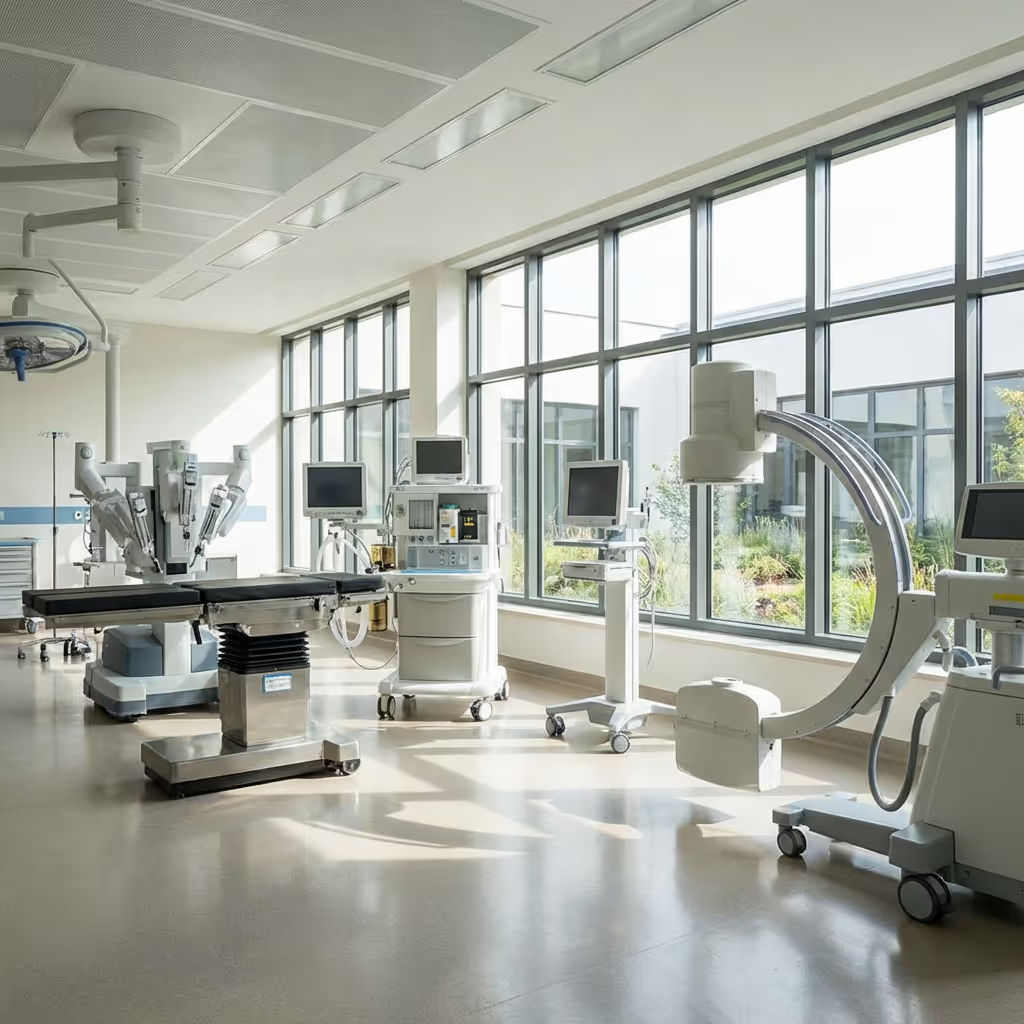Medical Equipment Appraisal
Certified, USPAP-compliant medical equipment appraisers for tax, legal, and financial reporting purposes.








Offered by world-class medical equipment appraisers
About AppraiseItNow's Medical Equipment Appraisal Services
AppraiseItNow offers fast, fully online or onsite medical equipment appraisals for legal, tax, and financial reporting purposes. Our mission is to deliver defensible, USPAP-compliant valuations with exceptional speed, professionalism, and client service.
Our medical equipment appraisers serve both individuals and organizations that require independent valuations for IRS filings, charitable contributions, lending and asset-based financing, litigation support, insurance claims, estate and gift tax reporting, and other compliance-driven uses.
Medical Equipment We Appraise
Large Medical Facilities
Capital-intensive healthcare environments operating high-value, fixed, and system-based medical equipment.
Common asset types include:
- MRI, CT, and PET imaging systems
- X-ray, fluoroscopy, and radiography equipment
- Nuclear medicine systems
- Surgical lights, operating tables, and integrated operating room equipment
- Anesthesia machines and ventilators
- Patient monitoring systems
- Sterilization and central processing equipment
- Imaging room buildouts and fixed installations
- Laboratory analyzers and diagnostic systems
Facility types include:
- Hospitals and health systems
- Imaging and radiology centers
- Cancer treatment centers
- Dialysis facilities
- Outpatient surgical centers
Small Private Medical Practices
Physician offices and specialty clinics utilizing diagnostic, treatment, and examination equipment across a wide range of disciplines.
Common asset types include:
- Dental chairs and dental imaging systems
- Ultrasound and endoscopy equipment
- Medical, cosmetic, and YAG lasers
- Autoclaves and sterilizers
- Exam tables and exam room equipment
- ECG / EKG machines and defibrillators
- Vital signs monitors and oximeters
- Ophthalmology and optometry equipment
- ENT and dermatology equipment
AppraiseItNow frequently serves as an optometry machinery appraiser and surgical equipment assessor for practices requiring formal valuations for tax, financing, legal, or compliance purposes.
Personal & Individually Owned Medical Equipment
Medical equipment that is personally owned or not tied to a single fixed healthcare facility, including assets used in home, mobile, or independent clinical settings.
Common asset types include:
- Portable ultrasound systems
- Wheelchairs and power mobility devices
- CPAP and BiPAP machines
- Oxygen concentrators
- Dental equipment
- Mobile diagnostic devices
- Home monitoring equipment
- Therapy and rehabilitation equipment
- Practitioner-owned clinical devices
How much does a medical equipment appraisal cost?
Our medical equipment appraisal pricing is transparent, scope-based, and tailored to the intended use of the appraisal. Fees are quoted as a fixed price (not hourly) after a brief review of your equipment list to ensure proper scoping.
Standard Medical Equipment Appraisals - Start at $295
- USPAP-compliant reports for standard purposes (Insurance Coverage, Personal Use, Probate Court, Estate Distribution)
Advanced Medical Equipment Appraisals - Start at $395
- USPAP-compliant reports for advanced purposes (M&A Due Diligence, Asset-Based Lending, IRS Purposes, Insurance Claims, Legal Purposes)
Pricing by Volume
For multiple medical equipment assets, discounted aggregate pricing may apply:
- 1 item: $295 – $595
- Up to 10 items: $995 – $2,200
- 50+ items: $5,000 – $10,000+
Final pricing is confirmed before work begins.
- Typical project fees fall between $695 – $2,200
- Final pricing depends on scope, asset mix, and intended use
Typical Fee Range
What Drives Cost
- Variety of equipment categories, models, and technical complexity
- Quantity of line items and duplicate SKUs to analyze
- Condition differences and need for onsite verification or additional research
- Documentation quality (clear photos, serial numbers, specifications, maintenance logs)
- Intended use of the appraisal and related compliance requirements
Services provided in collaboration with our sister appraisal brand: Value Doctor
Medical Equipment & Machinery valuations for commercial and personal clients

Servicing Commercial & Industrial Businesses
AppraiseItNow serves major businesses and commercial clients, including:
- Banks and lenders
- Hospitals and healthcare practices
- Medical Equipment Manufacturers
- Internal finance teams
- CPAs
- Attorneys

Servicing Individuals & Households
AppraiseItNow also serves individual consumers with projects large and small. These clients often include:
- High Net Worth Individuals (HNWIs)
- Couples going through marital divorce
- Families dealing with estate planning or post-death estate matters
- Individuals dealing with insurance or other third-party claims
- Individuals going through major financial or other life events
Written USPAP-compliant appraisal reports for when defensibility matters.
Given the USPAP-compliant nature of AppraiseItNow’s appraisal reports, we prepare our deliverables for major legal, tax, and financial reporting purposes for individual and commercial clients.
Popular uses of our appraisal reports include:
Tax, Estate & Financial Planning
- Capital gains tax
- Gift and estate tax
- Charitable donations
- IRA conversions
- Investment reporting
- Estate planning and probate
Transactions, Lending & Investment
- Loan collateral
- Purchase price allocation & cost segregation
- Mergers and acquisitions
- Investment analysis
Insurance & Risk Management
- Insurance coverage
- Insurance claims (Total Loss and Diminished Value)
- Third-party claims
Legal, Compliance & Reporting
- Bankruptcy filings
- Government purposes
Life Events & Special Circumstances
- Divorce
- Social Security reporting
- E-2 visa applications
Medical Equipment Appraisal – Frequently Asked Questions (FAQ)
What types of medical equipment does AppraiseItNow appraise?
We appraise a broad range of medical equipment, from large capital assets used by hospitals and imaging centers to smaller diagnostic and treatment equipment used by private practices and individuals. This includes imaging systems, surgical and operating room equipment, laboratory analyzers, dental and ophthalmology equipment, rehabilitation devices, and personally owned medical equipment.
Are your medical equipment appraisals USPAP-compliant?
Yes. All AppraiseItNow medical equipment appraisals are prepared in full compliance with the Uniform Standards of Professional Appraisal Practice (USPAP) and are designed to withstand third-party review by the IRS, lenders, courts, auditors, and insurers.
What are common reasons someone needs a medical equipment appraisal?
Clients commonly request medical equipment appraisals for IRS filings and charitable contributions, estate and gift tax reporting, financing and asset-based lending, insurance coverage and claims, litigation support, divorce proceedings, bankruptcy, and internal financial reporting.
Do you provide online or remote medical equipment appraisals?
Yes. Many medical equipment appraisals can be completed remotely using documentation, photos, serial numbers, and supporting records. When an onsite inspection is required due to asset type, intended use, or complexity, we coordinate an in-person appraisal with a qualified local appraiser.\
Do you provide surgical equipment appraisals?
Yes. AppraiseItNow regularly serves as a surgical equipment assessor, valuing operating room and procedural equipment such as surgical tables, lights, anesthesia machines, monitoring systems, sterilization equipment, and other OR-related assets. Our surgical equipment appraisals are USPAP-compliant and prepared for uses including IRS filings, lending, litigation, insurance, and transactional purposes.
How much does a medical equipment appraisal cost?
Fees are scope-based and quoted as a fixed price before work begins, with single-item appraisals typically starting at $295, more complex or compliance-driven assignments starting at $395, and most projects falling within a standard range of $695–$2,200, depending on the asset mix, volume, intended use, and quality of available documentation.
Do you offer discounted pricing for multiple pieces of equipment?
Yes. We offer volume-based pricing for multi-asset medical equipment appraisals. Aggregated pricing is available for small equipment sets as well as large inventories, and all pricing is confirmed in advance.
How long does a medical equipment appraisal take?
Most medical equipment appraisals are completed within 7–10 business days once all required information is received. Expedited turnaround options may be available for time-sensitive matters.
Who prepares the appraisal report?
Each appraisal is prepared by a credentialed appraiser in accordance with USPAP.
Can you appraise specialized or custom medical equipment?
Yes. We regularly appraise specialized, custom-configured, and legacy medical systems, including integrated imaging rooms, surgical suites, and practitioner-owned specialty equipment.
Do you buy, sell, or broker medical equipment?
No. AppraiseItNow is an independent appraisal firm. We do not buy, sell, finance, or broker medical equipment, which ensures our valuation conclusions remain objective and defensible.
What information do you need to get started?
Typically, we request equipment lists, make/model information, serial numbers, photos, condition details, and the intended use of the appraisal. Clear documentation helps reduce cost and turnaround time.
Can AppraiseItNow appraise equipment located anywhere in the U.S.?
Yes. We provide nationwide coverage and can appraise medical equipment located anywhere in the United States.
Will my appraisal be accepted by the IRS, lenders, or courts?
Our reports are prepared specifically to meet third-party scrutiny. While acceptance is ultimately determined by the reviewing authority, AppraiseItNow appraisals are routinely used for IRS filings, financing, litigation, and other compliance-driven purposes.

.avif)


